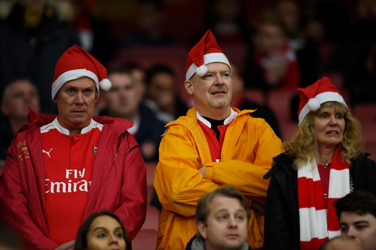After 'enjoying' a six-goal thriller with Liverpool, it's of course worth remembering that the Sky TV initially wanted this fixture to be played out on Christmas Eve. The suggestion brought howls of derision from many self-proclaimed traditionalists who took to social media to ask: 'what next will these TV people force upon us? A match on Christmas Day morning?', seemingly unaware that this actually was a footballing tradition that did exist from the Victorian era right up until 1950s. You see, the thing with footballing traditions (as is often the case with many other traditions) is that they are often a lot like Trigger's broom in that famous 'Only Fools and Horses' sketch from Christmas 1996. They've often had about seventeen new heads and fourteen new handles during their time.
The 'traditional' Christmas fixture list actually only included Christmas Day and Boxing Day – these the only two bank holidays during a Christmas period until 1974. There were previously no New Years' Day fixtures outside of a Saturday prior to forty-three years ago on account of the fact that prior to this point, it wasn't a national holiday people had to work the following day (something to remember on January 1st 2018, when you're hung over!). From a personal point of view (and not taking into account how it would have affected Merseyside based Liverpool fans), Arsenal playing Liverpool on Christmas Eve wouldn't have been troublesome for me in slightest as trains out of London are running all day until at least about 9PM.
To be frank, I've actually always found the traditional Boxing Day and New Year's Day fixtures a bigger pain in the arse. It is in fact a huge relief to me that we now have a six-day break from football over the Christmas period and that they'll also be no New Year's Day game for Arsenal this season. In thirty-two years of attending football matches, I've never done a Boxing Day or New Years Day fixture. Not through being unwilling to do so, but - in the case of the former at least - from a logistical point of view, they've always been impossible to do. Provincial rail services rarely run on Boxing Day, whereas before 1948 both Christmas Day and Boxing Day actually had a full train service which made attendance easier. In fact, the Tube ran trains on Christmas Day until as late as 1979. John Lydon's punk outfit Public Image Ltd were actually able to play their debut gig at the Finsbury Park Rainbow on Christmas Day 1978.
The Christmas fixture tradition also grew up in an era when people supported the side in their local neighbourhood (at the very least from the same city). Nowadays (particularly so with the big London sides), very often people live at least thirty miles from the team they support. Boxing Day or New Years' Day fixtures often used to mean playing Spurs or another London side. Often these days, they are now played further afield in places like Southampton (often further), meaning that a drive is required and that away fans would be required to keep off of the source on Christmas Day or New Year's Eve to avoid the breathalyzer (and who actually wants to do that?).
People often have family commitments on Boxing Day, meaning that you have to make enquiries with whoever you are visiting as to whether they have whatever channel the game is on and, of course, whether they are even willing to show it (either way, it's you imposing your own football obsession on your host in their own home). Very often on Boxing Day, you're making the decision between family loyalty and football loyalty, and who really wants to make such a choice? What you have to remember is that the society which these traditions exist in hasn't remained static. Christmas fixtures were born in an era when midweek floodlit games and Sunday football didn’t exist. A bank holiday like Christmas Day and Boxing Day was a rare opportunity outside of a Saturday afternoon to get a game played in front of a sufficiently large enough crowd for football clubs to reap gate receipts from.
They were also born in an era when home-centred entertainment simply didn't exist (not even a wireless in 1888!) and it is the growth of this which has shaped the existence and form of the Christmas fixture list ever since. The tradition of Christmas afternoon fixtures became the tradition of Christmas morning fixtures (11AM kick off) once the wireless existed and the game clashed with the traditional Christmas message of the reigning monarch. By the 1950s and the introduction of Television, the traditional family Christmas became almost entirely home centred, sounding the death kneel for the Christmas Day fixture. And in the late 2010s, far from television taking a wrecking ball to the tradition, it's most probably Television what's keeping this one hanging on from dear life.
Surely the greatest beneficiary of the Boxing Day or New Years Day fixture are Sky or BT Sport. What else are they going to show to get people watching it on those days if there isn't any live sport? It's also odd that the traditional Easter fixture list was axed long ago without much of an outcry. This was probably a bigger footballing tradition if anything. In its traditional guise it involved three games in four days (Good Friday, Easter Saturday and Easter Monday), which were played out in better weather conditions and came at a stage of the season where they often decided promotion, relegation and League Championships.
The demands of TV and the Champions League put paid to the Easter fixture list. The same demands are preventing common sense from axing the Boxing Day and New Year's Day fixtures which are an inconvenience to many.
*Follow me on Twitter@robert_exley








